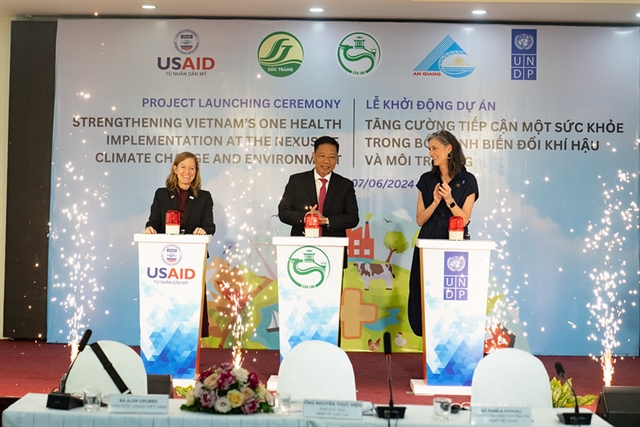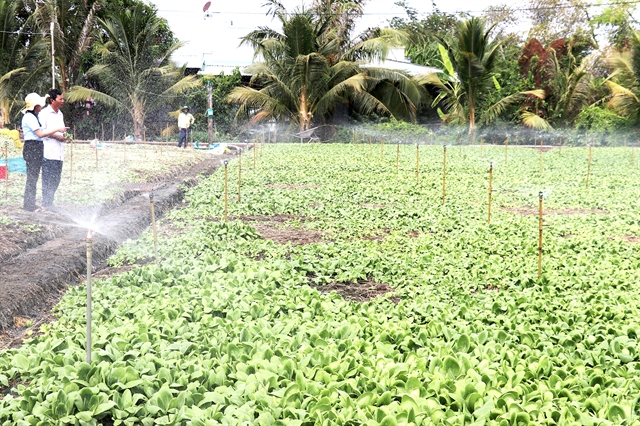 Environment
Environment

 |
| Vegetable fields installed with automatic spray irrigation systems in Tiền Giang Province’s Gò Công Tây District. — VNA/VNS Photo Hữu Chí |
TIỀN GIANG — Rice farmers in Tiền Giang Province have switched to growing vegetables during the dry season, which has helped them cope with climate change and earn decent incomes.
The Cửu Long (Mekong) Delta province normally suffers from saltwater intrusion up rivers during this period and thus lacks water for irrigation.
To cope, it encourages farmers whose rice fields lack water to switch to growing drought-resistant crops.
The dry period lasts December to May.
Farmers have switched to vegetables on more than 2,500ha of rice fields in the first four months of this year.
In the last dry season, farmers in coastal areas grew vegetables on nearly 14,000ha and harvested 256,000 tonnes, according to the province's Department of Agriculture and Rural Development.
Nguyễn Văn Mẫn, its director, said the cultivation of vegetables in the Gò Công freshwater region, which includes Gò Công Đông and Gò Công Tây districts and Gò Công City, was lucrative with farmers getting bumper harvests and high prices.
They earned an average of VNĐ133 million (US$5,200) per hectare, two to three times higher than that from high-quality rice, as they could easily manage the impacts of the saltwater intrusion, he said.
Effective measures
Before the last dry season the province took many measures to prevent saltwater intrusion and store freshwater, and these helped farmers.
It spent VNĐ1.4 trillion ($54.9 million) building large sluices at places where canals connect with the Tiền River, a major tributary of the Mekong River, to keep out saltwater coming up the river.
It built 242 irrigation works and dredged irrigation canals running a total length of 355km.
Đỗ Thành Sơn, deputy general director of the Tiền Giang Irrigation Work Exploitation and Management One Member Ltd. Co, said his company regularly monitors the salinity of water in the Tiền and Vàm Cỏ rivers to promptly take preventive measures.
During the recently ended dry season, with the encouragement of authorities, more and more farmers stored water in ponds in their fields and used efficient irrigation methods such as automatic drip and spray irrigation.
Following their success in growing vegetables, farmers in Gò Công plan to grow a total 15,400ha during the summer-autumn and autumn-winter crops this year, he said.
They have set up dozens of clean vegetable growing co-operatives that use advanced techniques, grow vegetables to Vietnamese good agricultural practices (VietGAP) standards and in nets and polygreen houses.
Nguyễn Thanh Quang, director of the Hoà Thạnh General Agriculture Co-operative in Gò Công Tây’s Bình Tân Commune, said the use of machinery during the growing stages has been expanded.
His co-operative grows vegetables in net houses, and this helps prevent diseases and reduces costs, and fetches high profits, he said.
Its members can grow 10 crops a year and earn profits of VNĐ5-8 million ($200-310) per 1,000sq.m per crop, he said.
Vegetable growing co-operatives have linked up with supermarkets, collective kitchens and wholesale markets in the province and elsewhere and sell two to three tonnes of vegetables each daily.
The coastal Gò Công Đông District has started growing vegetables in disadvantaged areas in the dry season.
Cây Bàng Hamlet in Tân Thành Commune is situated at the mouth of the Cửa Tiểu Estuary, so it is severely affected by saltwater intrusion. Its farmers have switched to other suitable crops in the dry season, especially watermelon.
Nguyễn Văn Khuê, head of the hamlet, said: “To cope with saltwater intrusion and drought during the last winter-spring crop, farmers used all farming areas to grow vegetables, including 40ha of watermelon.”
The fruit grown in Tân Thành Commune is of high quality and preferred by consumers, he said.
Farmers earn an average of VNĐ100 million ($4,000) per hectare per crop from the fruit, he said.
More and more farmers use advanced farming techniques and automatic irrigation.
The province has 3,400ha of vegetable growing areas equipped with automatic spray irrigation system, or 80 per cent of the total area.
Some 65 per cent of the province’s vegetable growing areas adopt integrated pest management and 70 per cent use organic fertilisers and bioproducts.
The province has taught farmers in major farming areas techniques for growing clean vegetables and helped them secure outlets for their produce. — VNS




